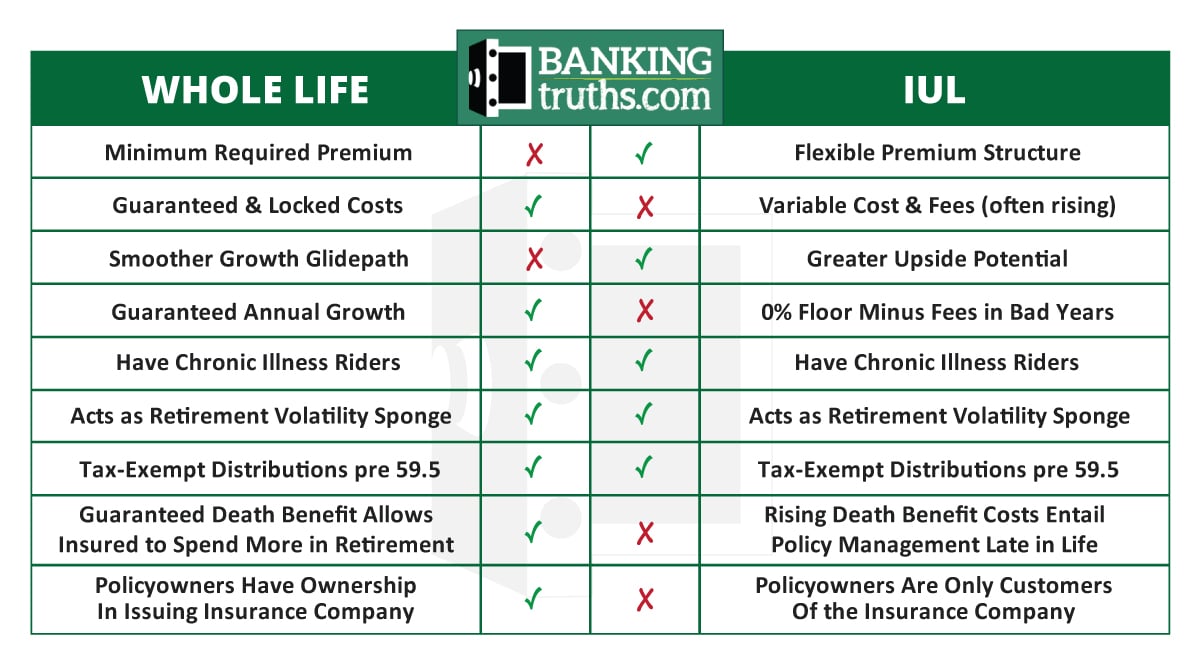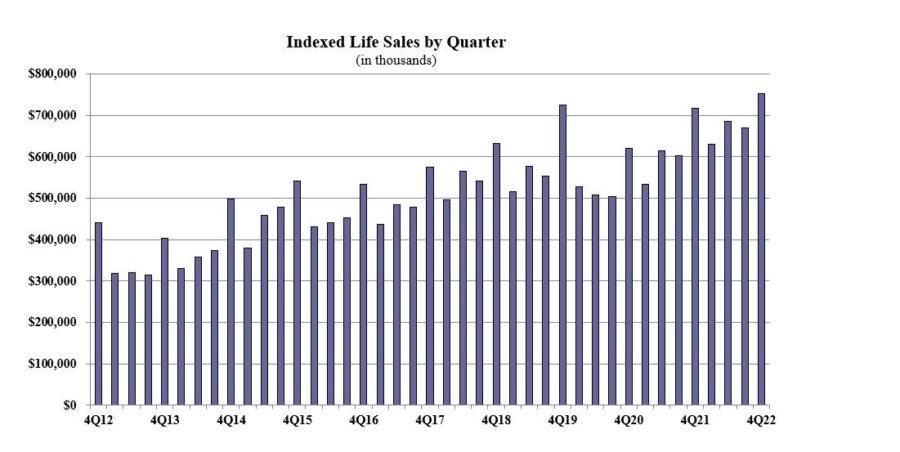All Categories
Featured
Table of Contents
1), commonly in an effort to beat their classification averages. This is a straw guy disagreement, and one IUL people like to make. Do they contrast the IUL to something like the Vanguard Total Amount Securities Market Fund Admiral Show to no tons, an expenditure proportion (EMERGENCY ROOM) of 5 basis factors, a turn over ratio of 4.3%, and an exceptional tax-efficient document of distributions? No, they compare it to some dreadful proactively managed fund with an 8% load, a 2% EMERGENCY ROOM, an 80% turnover proportion, and a horrible record of temporary capital gain circulations.
Mutual funds commonly make annual taxable distributions to fund proprietors, even when the value of their fund has actually decreased in worth. Mutual funds not just call for earnings reporting (and the resulting annual taxes) when the mutual fund is rising in worth, but can likewise enforce revenue taxes in a year when the fund has decreased in value.
That's not just how mutual funds function. You can tax-manage the fund, harvesting losses and gains in order to minimize taxable distributions to the financiers, however that isn't somehow going to change the reported return of the fund. Just Bernie Madoff kinds can do that. IULs avoid myriad tax traps. The possession of common funds might require the shared fund owner to pay approximated tax obligations.

IULs are easy to place so that, at the proprietor's fatality, the recipient is not subject to either income or inheritance tax. The very same tax obligation reduction methods do not work almost too with common funds. There are many, usually pricey, tax catches connected with the moment buying and selling of mutual fund shares, traps that do not put on indexed life insurance policy.
Opportunities aren't extremely high that you're going to be subject to the AMT due to your common fund distributions if you aren't without them. The remainder of this one is half-truths at ideal. While it is real that there is no revenue tax due to your heirs when they inherit the proceeds of your IUL plan, it is likewise real that there is no earnings tax due to your heirs when they inherit a common fund in a taxable account from you.
Veterans Universal Life Insurance
The federal inheritance tax exception limit is over $10 Million for a couple, and growing every year with rising cost of living. It's a non-issue for the vast majority of physicians, a lot less the rest of America. There are much better ways to avoid estate tax concerns than purchasing financial investments with reduced returns. Common funds might trigger earnings taxes of Social Protection benefits.

The development within the IUL is tax-deferred and might be taken as tax obligation cost-free revenue via financings. The plan owner (vs. the mutual fund supervisor) is in control of his/her reportable earnings, therefore enabling them to lower or perhaps eliminate the tax of their Social Protection benefits. This is fantastic.
Here's an additional minimal problem. It holds true if you get a common fund for say $10 per share simply before the distribution day, and it distributes a $0.50 distribution, you are after that going to owe tax obligations (most likely 7-10 cents per share) although that you haven't yet had any kind of gains.
In the end, it's truly about the after-tax return, not how much you pay in taxes. You're likewise probably going to have even more cash after paying those tax obligations. The record-keeping needs for having shared funds are substantially much more complex.
With an IUL, one's records are kept by the insurer, copies of yearly declarations are mailed to the owner, and circulations (if any type of) are totaled and reported at year end. This one is also kind of silly. Naturally you should keep your tax obligation documents in situation of an audit.
Iul Training
Barely a factor to buy life insurance. Shared funds are commonly component of a decedent's probated estate.
Furthermore, they are subject to the hold-ups and costs of probate. The profits of the IUL plan, on the various other hand, is constantly a non-probate distribution that passes beyond probate straight to one's named beneficiaries, and is therefore not subject to one's posthumous creditors, undesirable public disclosure, or comparable hold-ups and costs.
Medicaid disqualification and life time income. An IUL can offer their proprietors with a stream of income for their entire life time, no matter of just how long they live.

This is valuable when organizing one's affairs, and transforming assets to earnings prior to an assisted living home arrest. Mutual funds can not be transformed in a similar fashion, and are often considered countable Medicaid assets. This is another foolish one supporting that inadequate people (you understand, the ones that need Medicaid, a government program for the inadequate, to pay for their retirement home) need to utilize IUL rather of mutual funds.
Best Indexed Universal Life Insurance
And life insurance policy looks horrible when contrasted rather versus a retirement account. Second, people who have money to buy IUL above and beyond their retirement accounts are mosting likely to have to be horrible at taking care of cash in order to ever before qualify for Medicaid to spend for their retirement home prices.
Persistent and terminal illness motorcyclist. All policies will enable a proprietor's simple accessibility to cash money from their policy, frequently waiving any type of surrender charges when such individuals endure a major illness, require at-home treatment, or become restricted to a nursing home. Shared funds do not offer a similar waiver when contingent deferred sales charges still relate to a common fund account whose owner needs to offer some shares to fund the expenses of such a stay.
What Is Indexed Universal Life Insurance
Yet you get to pay more for that advantage (cyclist) with an insurance plan. What an excellent deal! Indexed universal life insurance policy offers survivor benefit to the recipients of the IUL owners, and neither the owner neither the recipient can ever shed cash due to a down market. Common funds offer no such guarantees or death advantages of any kind.
I absolutely do not require one after I reach monetary freedom. Do I want one? On standard, a purchaser of life insurance pays for the real expense of the life insurance policy benefit, plus the costs of the plan, plus the profits of the insurance policy business.
Indexlife
I'm not totally sure why Mr. Morais threw in the entire "you can not lose money" once again below as it was covered rather well in # 1. He simply wanted to repeat the best selling factor for these points I expect. Again, you do not shed nominal dollars, however you can lose real bucks, as well as face significant chance expense due to low returns.
:max_bytes(150000):strip_icc()/dotdash-comparing-iul-insurance-iras-and-401ks-Final-71f14693e37d4fb1b0736112179802b5.jpg)
An indexed global life insurance plan owner might exchange their policy for a totally various plan without triggering revenue tax obligations. A mutual fund owner can not move funds from one common fund firm to an additional without marketing his shares at the former (therefore triggering a taxed event), and redeeming brand-new shares at the latter, commonly based on sales costs at both.
While it holds true that you can trade one insurance coverage policy for an additional, the reason that people do this is that the first one is such a dreadful policy that also after getting a new one and undergoing the very early, adverse return years, you'll still come out in advance. If they were offered the best policy the first time, they shouldn't have any kind of need to ever exchange it and experience the early, negative return years once again.
Table of Contents
Latest Posts
New York Life Iul
Accumulator Universal Life Insurance
Gul Policy
More
Latest Posts
New York Life Iul
Accumulator Universal Life Insurance
Gul Policy